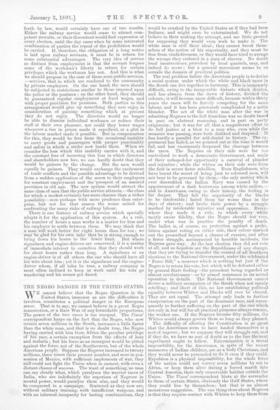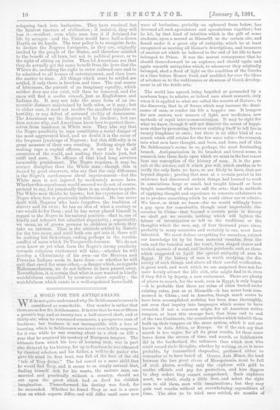THE NEGRO DANGER IN THE UNITED STATES.
WE cannot believe that the Negro Question in the United States, immense as are the difficulties it involves, constitutes a political danger in the European sense. That is to say, we cannot believe in a great Negro insurrection, or a Race War of any formidable proportions. The power of the two races is too unequal. The Times' correspondent harps on the fact that the Negro, who now counts seven millions in the South, increases a little faster than the white man, and that is no doubt true, the Negro having carried with him from Africa the peculiar privilege of his race, a certain exemption from the effects of beat and malaria ; but his force as an insurgent would be pitted against the force, not of the Southerners, but of the whole American people. Suppose the Negroes increased to twenty millions, three times their present number, and were in pos- session of Mexico, with sufficient implements of war, they still could not fight the Union when in earnest, with even a distant chance of success. The want of something, no man can say clearly what, which paralyses the warrior races of India, who are indefinitely the superiors of Negroes in mental power, would paralyse them also, and they would be conquered in a campaign. Scattered as they now are, without military training, with insufficient weapons, and with an inherent incapacity for lasting combinations, they would be crushed by the United States as if they had been Indians, and might even be exterminated. We do not believe in their making the attempt, and see little ground for supposing they would even wish to make it. The white man is still their ideal ; they cannot break them- selves of the notion of his superiority, and they must be free from vindictiveness, or they would have tried to avenge the wrongs they endured in a state of slavery. No doubt local insurrections, provoked by local quarrels, may, and indeed do occur ; but a general movement seems to us outside the domain of practical politics.
The real problem before the American people is to devise a social system under which the white and black races in the South can live together in harmony. This is immensely difficult, owing to the insuperable distaste which divides, and has always, from the dawn of history, divided the colours ; it will become more difficult, because within thirty years the races will be fiercely competing for the same labour, and it has been grievously complicated by a noble blunder. The act of the white man after the war in admitting Negroes to the full franchise was no doubt based in part on abstract reasoning, and in part on party exigencies ; but it was for all that a magnificent effort to- do full justice at a blow to a race who, even while the measure was passing, were both disliked and despised. R- ims hardly a parallel for self-denial in history. The ex- periment has failed, as we pointed out at the time it would fail, and has enormously deepened the cleavage between. the races. The Negroes on their side were far too- uncivilised to work a democratic Government, and made of their unhoped-for opportunity a carnival of plunder and injustice ; while the whites on their side were from the first in secret fierce rebellion. Even Englishmen, who have learnt the secret of being just to coloured men, will not bear to be governed by them,—the only mutiny which ever discredited the Indian Navy was caused by the appointment of a dark boatswain among white sailors,— and in Americans, owing to their history, the feeling is- far deeper. They felt the superiority of the blacks- to be intolerable ; hated them far worse than in the' days of slavery ; and broke their power by a struggle marked by intolerable injustice and oppression. Every-- where they made it a rule, to which every white tacitly swore fidelity, that the Negro should not vote,. under what was in practice the penalty of death. The ballot is, of course, no protection against a prohi- bition against voting on either side, their colour marked out the proscribed beyond a chance of evasion, and after. a fierce struggle, accompanied by horrible incidents, the- Negroes gave way. At the last election they did not vote- at all, and so hopeless are the Republicans of any change, that they are trying to transfer the control of all Southern elections to the National Government,. under the celebrated " Force Bill," a measure which is nothing but just if the Negro is to retain his vote, but which will be defeated either by general State feeling—the precedent being regarded as almost revolutionary—or by armed resistance to its actual operation in details. The National Government cannot decree a military occupation of the South when not openly rebelling ; and short of this, no law establishing political equality between Whites and Blacks will ever be' obeyed. They are not equal. The attempt only leads to further exasperation on the part of the dominant race, and conse- quently to further suffering on the part of the one which not only is, but Will for all practical purposes always remain, the weaker one. If the Negroes became fifty millions, the Whites would always govern them so long as they pleased. The difficulty of altering the Constitution is so great that the Americans seem to have landed themselves in a sort of impasse ; but we suppose they will struggle out, and if they do, we have no sort of doubt as to the line the next experiment ought to follow. Extermination is a moral impossibility, for the Americans, in spite of the recent massacres of Indian children, are as a body Christians, and. they would never be persuaded to do it even if they could.. Expulsion is a physical impossibility, for the whole force of the nation could not convey seven millions by sea. to Africa, or keep them alive during a forced march into Central America, their only conceivable habitat outside the Union. The Times' correspondent hints at the surrender to them of certain States, obviously the Gulf States, where they could live by themselves ; but that is an almost monstrous suggestion. The one thing clear about Negroee is that they require contact with Whites to keep them from relapsing back into barbarism. They have received but the faintest tincture of civilisation; if isolated, they will lose it—recollect, even white men lose it if detained for life by savages—and the Union would have half-a-dozen Haytis on its hands. The true policy is to recognise facts, to declare the Negroes foreigners, as they are, originally invited by the people of the States, and therefore entitled to the benefit of all laws, but not to political power, or to the right of sitting on juries. Then let Americans see that they do actually get the same benefit from the laws that the Whites do, including the right to enter railroad cars and to be admitted to all houses of entertainment, and then leave the matter to time. All things which must be settled are settled, if only there is freedom and time. The real source of bitterness, the pursuit of an imaginary equality, which neither does nor can exist, will then be removed, and the races will find a modue vivendi, just as Englishmen and Indians do. It may not take the same form of an im- movable distance maintained by both sides, or it may ; but in either case, it need not involve the smallest injustice or hostility, or any defect of outward civility of demeanour. The Americans say the Negroes will be insolent ; but one does not see why, and Americans know how to protect them- selves from insolence in. White men. They also say that the Negro proclivity to rape constitutes a social danger of the most aggravated, kind, and no doubt it. is the cause of the frequent lynchings of Negroes ; but this difficulty is in great measure of their own creating. Nothing stops their making rape a capital offence, as it used to be in all countries of the world, and making their trials just, but swift and sure. No offence of that kind long survives inexorable punishment. The Negro requires, it may be, sterner discipline than the White man—though this is denied by good observers, who say that the only difference is the Negro's carelessness about imprisonment--but the . White man is not injured by moderately severe laws. Whether this experiment would succeed we do not, of course, pretend to say, for practically there is no evidence to quote. The White man thinks he knows ; but his experience of the Negro when free is practically infinitesimal. He has never dealt with Negroes who have forgotten the tradition of slavery and its vices ; he has no idea of what a century or two would do for them ; and he has never placed himself in regard to the Negro in his natural position—that is, one of kindly and tolerant but admitted superiority ; superiority, we mean, as of grown persons to children in whom they take an interest. That is the attitude settled by Nature for the two races, and until both can get into it, there will be nothing but bickerings, ending perhaps in the terrible conflict of races which De Tocqueville foresaw. We do not even know as yet what form the Negro's strong proclivity towards religious excitement will take,—whether he will develop a Christianity of his own—as the Mexican and Peruvian Indians ' seem to have done—or whether he will quit that creed for some other,—a danger which, as regards Mahommedanism, we do not believe to have passed away. Nevertheless, it is certain that what is now wanted is kindly watchfulness unspoiled by nonsense about equality the watchfulness which exists in a well-regulated household.















































 Previous page
Previous page